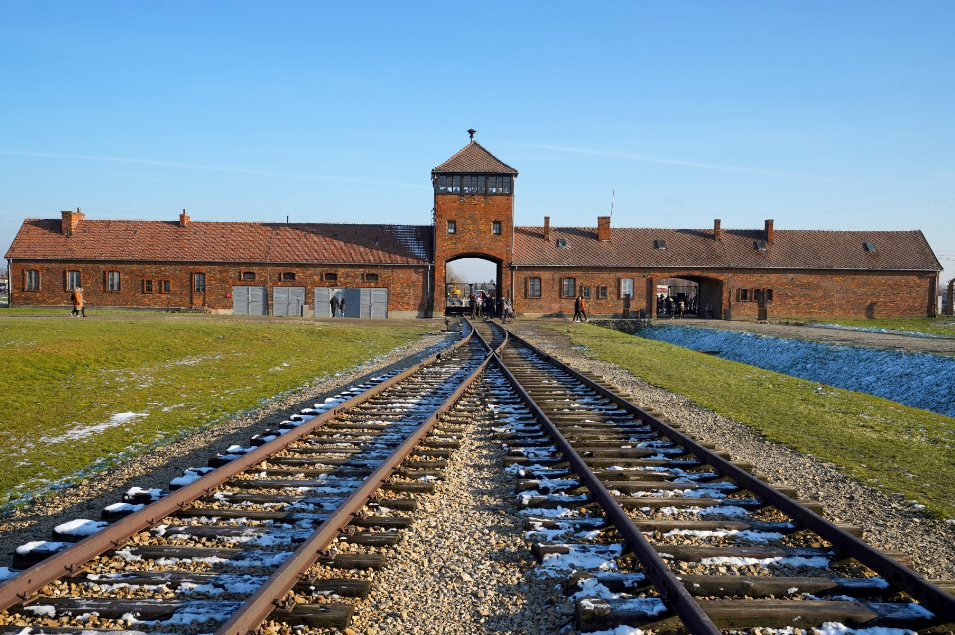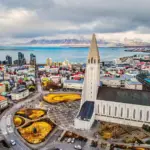
THE war tourism may seem like a controversial choice to some, but for others it offers a unique way to immerse yourself in history and the conflicts that shaped the world. This form of tourism allows courageous travelers to explore battlefields, museums, and historical monuments, and learn from the experience offered by these places.
In this section, we will introduce the concept of war tourism and how it offers a new perspective for travelers seeking a unique and enriching experience. We will discuss the history behind the war tourism, you famous destinations around the world, and the benefits and challenges of this type of trip. We will also highlight tips to plan an unforgettable and respectful war tourism trip.
Main Conclusions:
- War tourism offers a unique opportunity to explore the history and the conflicts that shaped the world.
- This form of tourism allows travelers to explore battlefields, museums, and historical monuments.
- You benefits include historical learning, peace awareness and valuing the memory of victims.
- You challenges include the nature emotionally impactful fates and the need to respect the memory of the victims.
- Tips practices can guarantee an unforgettable and respectful war tourism trip.
The story behind war tourism
War tourism isn't exactly a new concept. In fact, this form of travel has its roots in the late 19th century, when veterans of the American Civil War began returning to the battlefields to relive their experiences during the conflict.
However, it wasn't until after World War I that war tourism became popular among the masses. With the rise of international travel and the advent of mass tourism, travelers began visiting historical sites and battlefields, often guided by veterans of the conflicts or amateur historians.
Today, war tourism is a growing industry, with destinations around the world offering a unique opportunity for travelers to learn about the history and conflicts that shaped the world we live in.
The evolution of war tourism
War tourism has evolved significantly over the decades. Initially, travelers seeking this type of experience were predominantly veterans or family members of veterans. However, in recent years, this trend has changed.
People of all ages and social backgrounds are increasingly interested in war tourism. This can be attributed in part to the popularity of films and television series that depict the history of past conflicts.
A dive into history
One of the main attractions of war tourism is the opportunity to immerse yourself in the history and conflicts that shaped the world we live in. By visiting historical sites and battlefields, travelers can learn about history firsthand, often guided by experts who provide additional insights and context.
More than simply visiting a historical site, war tourism offers an enriching experience that can help deepen understanding of the significance of past conflicts and how they shaped the world today.
“War tourism allows people to delve deeper into history than any other type of tourism.”

Famous destinations for war tourism
War tourism offers the opportunity to visit historic destinations that have much to teach about history and the conflicts that shaped the world. Below, we present some of the most famous war tourism destinations around the world:
| Destination | Description |
|---|---|
| Hiroshima, Japan | The Japanese city of Hiroshima was devastated by an atomic bomb in 1945. Today, the Hiroshima Peace Memorial Museum offers a moving insight into the history of the atomic bomb and honors the victims of the conflict. |
| Auschwitz concentration camp, Poland | The largest Nazi concentration and extermination camp of World War II is a must-see for anyone interested in history. The site serves as a painful reminder of the Holocaust. |
| Tuol Sleng Genocide Museum, Cambodia | The museum is located in what was once a prison during the Khmer Rouge regime. The prison was maintained by the military to imprison and torture anyone suspected of opposing the regime. The museum is a significant reminder of what the Cambodian people endured during this period in history. |
| Berlin, Germany | The German capital is full of historic sites, such as the Berlin Wall and the Holocaust Memorial. Berlin is a popular destination for those who wish to explore the history of World War II and the Cold War. |
| Normandy, France | Normandy Beach was the site of the largest landing of Allied troops during World War II. Today, there are several museums and memorials honoring the brave soldiers who fought during the war. |

These are just some of the famous destinations for war tourism. There are many other locations around the world that provide travelers with a unique and unforgettable historical experience.
The benefits of war tourism
War tourism can offer a range of benefits For courageous travelers who want to delve into history and past conflicts. Below, we present some of the main benefits of this form of travel:
1. Historical learning
One of the main advantages of war tourism is the opportunity to learn about important historical events from a different perspective. By visiting historical sites and battlefields, travelers can gain a deeper understanding of past conflicts and how they shaped the world we live in today.
2. Valuing peace
War tourism can also help promote peace and raise awareness of the devastating impacts of conflict. By visiting places where violent conflicts have occurred, tourists can reflect on the importance of peace and dialogue to prevent violence.
| Benefits of war tourism | Description |
|---|---|
| Historical learning | War tourism offers a new perspective on important historical events, allowing travelers to learn more about past conflicts. |
| Valuing peace | When visiting places where violent conflicts have occurred, tourists can reflect on the importance of peace and dialogue. |
3. Awareness of the impacts of past conflicts
War tourism can also help raise awareness of the lasting impacts of past conflicts. By seeing firsthand the damage caused by wars and armed conflicts, tourists can gain a deeper understanding of the need to build a more peaceful and collaborative world.
4. Valuing culture
Furthermore, war tourism can help enhance the rich culture of the countries visited. Many historical conflict sites are also important cultural sites, offering tourists the opportunity to immerse themselves in local history and culture at the same time.
In short, although war tourism can be emotionally challenging, it can offer a number of benefits for those seeking a new travel perspectiveBy learning about important historical events, valuing peace and culture, and raising awareness of the impacts of past conflicts, tourists can return home with a deeper understanding of the world we live in.
Preparations for war tourism
Before venturing on a war tourism trip, it is important to carry out some preparations essential to ensure a safe, respectful, and enriching experience. Below, we list some tips to help you prepare:
- Research your destinations well: Before traveling, do thorough research on the places you plan to visit. Learn about the history of the conflict, points of interest, and safety recommendations.
- Documentation: Check if any special documentation is required to visit war tourism sites. Some countries may require a visa or special permit to access conflict zones.
- Security: Learn about the safety conditions in the places you plan to visit. Some areas may present risks to tourists, such as landmines or the presence of armed groups. Always follow the guidance of local authorities and specialized guides.
- Respect: War tourism involves visiting places historically marked by conflict and human tragedy. Respect the pain and memory of the victims and avoid disrespectful or insensitive behavior.
Hire a specialized guide
Hiring a specialized guide is one of the best ways to ensure a safe and enriching war tourism experience. Specialized guides have in-depth knowledge of the history of the sites visited, provide historical context, and help contextualize the events that marked the location. They can also provide information on safety, required documentation, and other logistical issues.
Necessary equipment
Some war tourism areas may require special equipment for visitor safety. For example, when visiting landmine areas, protective gear such as helmets and bulletproof vests is recommended. In other locations, special footwear or clothing appropriate for hiking in difficult-to-reach areas is required.

The role of guides in war tourism
Expert guides play a crucial role in war tourism, providing insights, historical context, and ensuring an enriching experience for travelers. They are responsible for guiding visitors and leading them through historical sites, providing accurate and relevant information about the events and battles that took place there.
Guide Qualifications
To become a war tourism guide, you need a broad understanding of the history and conflicts that occurred in the locations you visit. Additionally, you need communication and leadership skills to guide and engage visitors during their visit.
Qualifications vary by country and region, but many guides have academic degrees in history, social sciences, or related fields. They may also have military experience or be war veterans who want to share their experiences with other travelers.
Importance of guides
Expert guides play an important role in war tourism for several reasons. First, they provide historical context and insights that help visitors understand the battles and conflicts that took place in the locations they visit. This allows tourists to connect with history in a unique and meaningful way.
Furthermore, guides are able to customize the experience according to visitors' interests, ensuring that each guest has an enriching experience. They are also responsible for ensuring that visitors respect the sites and maintain a sensitive and respectful attitude toward the events that took place there.
How to choose a guide
When choosing a guide for war tourism, it's important to do some prior research and seek recommendations from other travelers or trusted tour companies. It's important to evaluate the guide's qualifications, experience, and approach to the places you'll be visiting.
It is also important to evaluate the guide's ability to communicate in a language the visitor understands, so that the experience is as enriching as possible.
With an expert guide, travelers can be assured of a complete and enriching war tourism experience that will provide them with a new perspective on history and the conflicts that shaped the world.
The challenges of war tourism
War tourism is a form of travel that can be emotionally impactful and requires respect for the areas visited. Furthermore, there are other challenges that travelers may face:
Challenge 1: Need for historical sensitivity
You tourist destinations War zones are places where conflicts occurred and, often, where many lives were lost. It is important that travelers respect the history and memory of the places they visit, avoiding inappropriate or disrespectful behavior. It is essential that tourists be sensitive to local culture and the pain of people who have been affected by the conflicts.
Challenge 2: Emotionally Impactful Nature
War tourism destinations can be emotionally impactful for many visitors. The nature of the conflicts, the stories, and the images can be shocking and difficult to deal with. It's important that travelers are prepared to deal with these emotions and know that it's normal to feel affected.
Challenge 3: Security Issues
Some war tourism destinations can be dangerous due to the possibility of explosives, landmines, and other unexploded ordnance. It's important that travelers meet the risks and take the necessary precautions to ensure your safety during the trip.
Challenge 4: Lack of tourist infrastructure
In many war tourism areas, tourist infrastructure can be limited, lacking hotels, restaurants, and other amenities. It's important for travelers to be prepared for a more rustic experience, bringing additional supplies and equipment if needed.
Challenge 5: Political Complexity
Some war tourism destinations may be located in areas with political complexities, such as ongoing conflicts or territorial disputes. It's important for travelers to research these issues before planning their trip and be aware of the potential political implications.

The socioeconomic impact of war tourism
In addition to providing an enriching experience for travelers, war tourism can also have a positive impact on the economic development of local communities.
Below, we present some data about the socioeconomic impact of war tourism in different destinations around the world:
| Destination | Average tourist spending (per day) | Number of jobs generated by war tourism | Value of preserved historical heritage |
|---|---|---|---|
| Normandy, France | R$ 300 | 4.500 | R$ 500 million |
| Hiroshima, Japan | R$ 250 | 3.000 | R$ 400 million |
| Sarajevo, Bosnia | R$ 200 | 2.500 | R$ 300 million |
As we can see from the table above, war tourism can generate significant employment and economic value for local communities. Furthermore, by investing in the preservation of historical heritage, war tourism can also contribute to preserving the memory of past conflicts and their importance in shaping world history.
However, it's crucial that war tourism be conducted responsibly and sustainably, taking into account the social, cultural, and environmental impacts of the areas visited. Therefore, it's essential that travelers respect the traditions and history of local communities and contribute to the economic development of these destinations in a conscious and positive way.
War tourism and ethics
War tourism is a form of travel that can generate ethical discussions, as it involves visiting places often linked to conflict and human tragedy. It's important to reflect on these issues when planning such a trip. Below, we present some ethical considerations for those seeking to venture into war tourism.
Respect for the memory of the victims
When visiting places associated with conflicts and wars, it's crucial to remember that many people died or suffered as a result of these historical events. It's important to respect the memory of the victims and adopt a respectful attitude during the visit, avoiding disrespectful or frivolous behavior.
Commercial exploitation
Some critics accuse war tourism of being a form of commercial exploitation of historical sites. It's important to choose trustworthy and ethical tourism companies that value historical and cultural heritage without exploiting them. local residents or the areas visited.
Trauma sensitivity
Historic sites associated with conflict and war can be emotionally impactful for many visitors. It's important to respect the sensitivities of others during your visit and adopt a compassionate approach to the traumas they may have experienced.
Awareness
War tourism can be an opportunity to raise awareness about the impacts of past conflicts and the reasons why they occurred. When traveling to these destinations, it's important to maintain a historical perspective and reflect on issues such as social justice and human rights.
Alternatives to war tourism
For those who wish to experience a historical journey without directly engaging in war tourism, there are many alternatives interesting. Here are some ideas:
- Visit museums: Historical museums offer a unique opportunity to learn about past conflicts in a carefully curated and respectful way. Some museums even offer interactive and educational experiences to complement the exhibits.
- Participate in learning activities: There are many ways to learn about the history of conflicts in a more active way. For example, you could take a history course or a workshop on the culture and traditions of a particular country.
- Explore historical sites: If you prefer experiences More practical, you can explore famous historical sites, such as castles, medieval cities, or ruins of ancient civilizations. This will allow you to learn about history in a more relaxed and relaxed way.
- Visit pilgrimage sites: Some people travel to sacred places and pilgrimages to experience a sense of spirituality or to learn about a new culture or religion. These trips often involve a meaningful journey and a sense of adventure, but they don't pose the same ethical questions as war tourism.
- Volunteer: Finally, a great way to engage with history while contributing to society is to volunteer at historic sites. Many organizations seek volunteers to help preserve historic sites, such as castles, forts, and ancient buildings.
Tips for an unforgettable war tourism trip
If you're planning a war tourism trip, there are some important tips to consider:
- Plan ahead: Do detailed research on the destination, including information about the history of the place, tourist attractions and security-related issues.
- Respect local regulations: Be sure to follow the rules and regulations of the location you are visiting, including dress codes and opening hours for establishments and attractions.
- Be sensitive: Remember that war tourism destinations can be emotionally impactful. Respect the memory of the victims and avoid inappropriate or disrespectful behavior.
- Hire a specialized guide: One expert guide can provide detailed information about the destination, as well as helping to contextualize the story and ensure an enriching experience.
- Be physically prepared: Some war tourism destinations may require physical exertion, such as hiking or climbing. Make sure you're prepared for the challenge.
By following these tips, you can have an unforgettable and enriching war tourism experience.

Conclusion
In short, war tourism offers a unique perspective for travelers looking to learn about history and past global conflicts. Furthermore, this form of tourism can have a positive impact on local communities, contributing to the local economy and the preservation of historical heritage.
However, it is important to remember that war tourism also presents challenges and ethical issues, such as the need to respect the memory of victims and avoid the commercial exploitation of historical sites.
For an unforgettable war tourism trip, it is recommended to take the preparations necessary, respect the places visited and seek guidance from specialized guides. In addition, alternatives how museum visits and educational activities can offer a historical experience without directly engaging in war tourism.
We conclude that, if carried out with respect and responsibility, war tourism can be an enriching and exciting form of travel.
FAQ
What is war tourism?
War tourism is a form of travel that allows tourists to immerse themselves in history and places marked by past conflicts and wars. It's an opportunity to experience and understand the historical events that shaped the world.
What are the most famous destinations for war tourism?
Some of the most famous destinations for war tourism include battlefields like Normandy, Pearl Harbor, and Verdun, museums like the Holocaust Museum in Jerusalem, and historical monuments like the Holocaust Memorial in Berlin.
What are the benefits of war tourism?
War tourism offers benefits such as historical learning, an appreciation for peace, and an awareness of the impacts of past conflicts. It allows travelers to gain a broader perspective and understand the importance of preserving peace.
What preparations are necessary for war tourism?
To venture into war tourism, it is It is important to do prior research on the chosen destinations, obtain the necessary documentation, find out about security in the area and respect the memory of the victims of the conflicts.
What is the role of guides in war tourism?
Guides specializing in war tourism play a crucial role, providing insights and historical context, ensuring an enriching experience for travelers. They help contextualize the places visited and understand the historical significance of the events that took place there.
What are the challenges of war tourism?
War tourism presents challenges such as the emotionally impactful nature of destinations, which can evoke intense feelings in travelers. Furthermore, it is essential to respect the memory of the victims and the historical significance of the places visited.
What is the socioeconomic impact of war tourism?
War tourism can have a socioeconomic impact positive impact on local communities, providing employment opportunities and contributing to the preservation of historical heritage. However, it is important to ensure that this tourism is carried out in a responsible and sustainable manner.
What are the ethical issues surrounding war tourism?
War tourism raises ethical issues, such as the commercial exploitation of historical sites and the need to respect the sensitivity of the areas visited. It's important to act responsibly, respectfully, and conscientiously when undertaking this type of travel.
Are there alternatives to war tourism for historical experiences?
Yes, there are alternatives For those seeking historical experiences without directly engaging in war tourism. Museums, visits to archaeological sites, participation in educational activities, and cultural excursions are some options that allow you to explore the past in a conscious and respectful way.
What are your tips for an unforgettable war tourism trip?
Some tips for ensuring an unforgettable war tourism trip include planning in advance, doing detailed research on the destinations, respecting the places and people involved, and being open to learning from the historical experience provided.
Lucas Wanderlust has a tireless spirit of adventure, always seeking new travel experiences. Fascinated by the world and the possibility of exploring unknown destinations, he fell in love with the sense of freedom and self-discovery that traveling alone provides. With a backpack on his back and a heart open to the unknown, Lucas embarks on exciting journeys, where each destination becomes a unique chapter in his life story. He gives himself body and soul to the magic of solo travel, inspiring others to follow in his footsteps and discover themselves through adventure.







